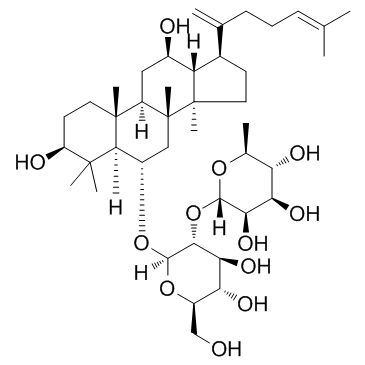147419-93-0
| Name | (3β,6α,12β,20E)-3,12-Dihydroxydammara-20(22),24-dien-6-yl 2-O-(6- deoxy-α-L-mannopyranosyl)-β-D-glucopyranoside |
|---|---|
| Synonyms |
(3β,6α,12β)-3,12-Dihydroxydammara-20,24-dien-6-yl 2-O-(6-deoxy-α-L-mannopyranosyl)-β-D-glucopyranoside
Ginsenoside Rg6 |
| Description | Ginsenoside Rg6 is the component isolated from notoginseng. Ginsenoside Rg6 inhibits TNF-α-induced NF-κB transcriptional activity with an IC50 of 29.34±2.22 μM in HepG2 cells. Ginsenoside Rg6 also exhibits apoptosis-inducing effect. |
|---|---|
| Related Catalog | |
| Target |
NF-κB:25.12 μM (IC50, in SK-Hep1 cell) NF-κB:29.34 μM (IC50, in HepG2 cell) Apoptosis |
| In Vitro | Ginsenoside Rg6 inhibits TNF-α-induced NF-κB transcriptional activity with an IC50 of 25.12±1.04 μM in SK-Hep1 cells, consistent with the data from HepG2 cells[1]. Ginsenoside Rg6 exhibits obvious anti-proliferative and apoptosis-inducing effects when it is applied to JK cells in vitro. Ginsenoside Rg6 blocks S arrest in the cell cycle. CCK-8 method shows that after Ginsenoside Rg6 is used, several groups with different concentrations obviously inhibits JK cell proliferation in human lymphocytoma, with evident dose dependency. Based on IC50, the median inhibitory concentration of Ginsenoside Rg6 is 83.08 μM[2]. |
| Cell Assay | HepG2 and SK-Hep1 cells are maintained in Dulbecco’s modified Eagle’s medium containing 10% heat-inactivated fetal bovine serum, 100 units/mL Penicillin, and 10 μg/mL Streptomycin, at 37°C and 5% CO2. Cell-Counting Kit (CCK)-8is used to analyze the effect of compounds (e.g., Ginsenoside Rg6; 0.01, 0.1, 1 and 10 μM) on cell toxicity. Cells are cultured overnight in 96-well plate (~1×104 cells/well). Cell toxicity is assessed after the addition of compounds on dose-dependent manner. After 24 h of treatment, 10 μL of the CCK-8 solution is added to triplicate wells, and incubated for 1 h. Absorbance is measured at 450 nm to determine viable cell numbers in wells[1]. |
| References |
| Density | 1.3±0.1 g/cm3 |
|---|---|
| Boiling Point | 850.6±65.0 °C at 760 mmHg |
| Molecular Formula | C42H70O12 |
| Molecular Weight | 766.998 |
| Flash Point | 468.2±34.3 °C |
| Exact Mass | 766.486755 |
| PSA | 198.76000 |
| LogP | 8.20 |
| Vapour Pressure | 0.0±0.6 mmHg at 25°C |
| Index of Refraction | 1.589 |
| Storage condition | 2-8℃ |
| RIDADR | NONH for all modes of transport |
|---|
